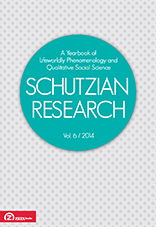Intentionality of Communication: Theory of Self-Referential Social Systems as Sociological Phenomenology
Intentionality of Communication: Theory of Self-Referential Social Systems as Sociological Phenomenology
Author(s): Mitsuhiro TadaSubject(s): Philosophy
Published by: Zeta Books
Keywords: Niklas Luhmann; Alfred Schutz; Edmund Husserl; Social Phenomena; Second Order Observation; Micro-Macro Link;
Summary/Abstract: The aim of this article is to explore how a self-referential social system, although it is not a human being, can be said to “observe.” For this purpose, the article reformulates Niklas Luhmann’s theory of social systems as sociological phenomenology, or the de-consciousness philosophized phenomenology, because a social system has the same structure of intentionality as consciousness: Just as consciousness is always consciousness of something, communication is always communication of something. In correlation to this communicative intentionality, communicated environments come and go as social phenomena. A social system is not a thing, but an autonomously observing subject. Hence, this systems theory takes on the role of a second-order observer: It observes how social systems as first-order observers observe selfreferentially because phenomena given to the natural attitude of the first-order observer constitute multiple social realities in daily life. Therefore, the theory of self-referential social systems is not objectivism, but a variation of mundane subjectivist phenomenology.
Journal: Schutzian Research. A Yearbook of Lifeworldly Phenomenology and Qualitative Social Science
- Issue Year: 2010
- Issue No: Volume 2
- Page Range: 183-202
- Page Count: 20
- Language: English
- Content File-PDF

